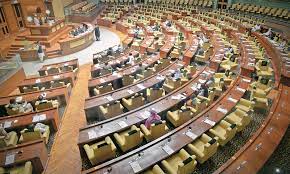Sindh Assembly slams centre’s move to establish media authority
KARACHI: The Sindh Assembly on Friday vehemently condemned the federal government’s proposed Pakistan Media Development Authority (PMDA), adopting through majority vote a resolution against the move to establish the media body and the recent closure of the National Assembly’s press gallery in Islamabad.
The Pakistan Tehreek-i-Insaf, the major opposition party in the provincial assembly, however, did not support the resolution against the proposed media law.
Information and Labour Minister Saeed Ghani, who tabled the resolution, said that the federal government since the time of its inception had been attempting to impose curbs on institutions, which enjoyed constitutional backing to work in an independent manner.
He added that the conspiracies were continuously being hatched to harm the prestigious national-level institutions including the judiciary, Election Commission of Pakistan, media and parliament.
Mr Ghani said that independent-minded judges of the superior judiciary were also being targeted in the same manner. “There is a long list of journalists who are either being kidnapped, tortured, or fired from service on account of their criticism against the government, their acts to uncover conspiracies against democracy, or else they freely expressed their opinion under the concept of freedom of speech,” he added.
He said that there were a number of journalists who had been rendered jobless as their employers were threatened to fire such outspoken media persons or else faced the possibility of closure of their media organisations.
“Several renowned TV anchorpersons were barred from appearing on the television screens also on this account,” he added.
‘Media destruction authority’
He said that the actual aim of setting up the PMDA was to establish a “Media destruction” authority.
“The move to establish the PMDA is also against the spirit of the 18th Amendment as print media industry is part of provincial domain after the amendment,” he added
The provincial information minister said the government had also made attempts to unduly get convened the joint sitting of parliament to get passed such controversial laws.
He said that the press gallery of the National Assembly had never been closed in the past as it also never had happened during dictatorial regimes.
The minister said that the press gallery had been closed on the day when the president of Pakistan had to address the joint session of parliament.
“Unfortunately, the National Assembly speaker claimed that closure of the press gallery had taken place at the behest of the journalists who cover the proceedings of the National Assembly. The concerned media persons in Islamabad, however, rejected his claim as he [speaker], later on, also failed to point out the journalists on whose behest the closure was ordered,” he said.
Mr Ghani said the federal government lacked the constitutional power to establish a single regulatory and controlling authority to manage electronic media, social, and print media at the same time.
“If this was a right move then it should have attracted support from at least one of the representative organisations of media persons but the fact is that all such representative bodies of journalists have been protesting against the proposal,” he said.
He said that almost all political parties including the coalition partners of the PTI-led federal government had been protesting against the proposal to establish the PMDA and also taking part in the protest drive of different representative bodies of media persons.
Addressing the federal government, he said: “We are not just confined to merely condemning the move as we will practically resist it.”
Source: Dawn

